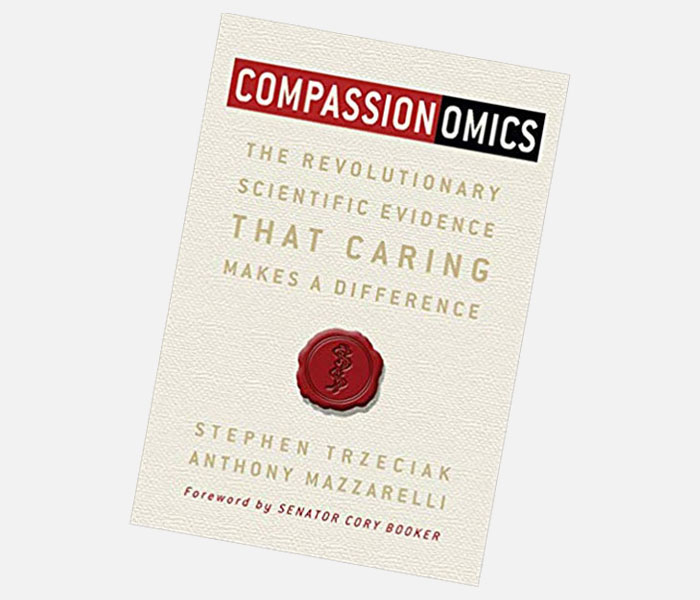In their recent book Compassionomics, Dr. Stephen Trzeciak and Dr. Anthony Mazzarelli make the case that there currently is a “compassion crisis” in healthcare today. As shown in one study from Harvard Medical School that was published in Health Affairs, researchers surveyed 1,300 patients and physicians and asked the question “Is the U.S. health system compassionate?”1 The result from the patient side was that nearly half of the respondents in the study shared the view that both the health care system and the providers are not compassionate. These findings are corroborated in other studies.
Compassion, as defined in the book, is “the emotional response to another’s pain or suffering, involving an authentic desire to help”. Over the years, the standard approach to increase compassion has been to appeal on an emotional and moral ground. Although there are a lot of books and articles using this approach to increase compassion, Dr. Trzeciak has found that it has not made traction or “moved the needle”. Why has compassion not moved based on this appeal? Also, does compassion even matter?
Both Dr. Trzeciak and Dr. Mazzarelli both feel that over 99% of the healthcare providers have their hearts in the right place. A person goes into this field to impact the lives of others so the heart is already there. As such, the plan is now to take a different approach. Instead of attempting to change the hearts, it will be about changing the minds of those in healthcare. However, in order to see if compassion really does matter, one needs to have the data to back it up. The concept had to be approached like any other research question. Start with a hypothesis and then test it based on solid science to receive an answer. This also means going into the research with the possibility that compassion does not matter.
As a person who loves to research, Dr. Trzeciak went to work and went through the research to test the hypothesis and to find the answers. Compassionomics is a compilation of the studies on compassion and not a representation of just some or a few studies. Using a systematic review and casting the largest net to capture the human knowledge on this subject, the results that came back represent where knowledge is today on this important topic and represents the best in current medical science. What was the result of the testing of the hypothesis?
With more than 1000 scientific abstracts examined and reviewed as well as more than 250 research papers, the data is overwhelming and the evidence is in: Compassion Matters! Not only does it matter, compassion impacts the whole health care system and so many lives within it. Once a person really looks through the data, it is difficult to “unsee” the scientific evidence.
Impact of Compassion on the U.S. Health Care System
It is no secret that the U.S. health care system has a large amount of challenges it faces over the next decade. Some of the many challenges include the rising costs and availability of healthcare, the lack of adherence by patients, the rising burnout in health care professionals, the rising rates of diseases like diabetes, the addiction to pain relieving drugs, and the rising rates of depression, loneliness, and obesity and their impacts. Lastly, as June is PTSD Awareness Month, it is important to share the impact that PTSD is having on individuals and families every day.
The scientific research shows that compassion impacts the above listed topics and many more. Whether it is reducing the costs of healthcare by having higher patient adherence, as an antidote to reducing burnout, as a way to impact the effect of diseases and trauma, compassion is a word and an action that can make a world of difference. More science continues to come out showing the importance of building that human connection to impact personal health.
40 Seconds – Perception of Time
The pressures in healthcare to match the balance of providing better care against the rising costs along with spending cuts continues to put more pressure on the individual within the health care facility to be more productive with less resources. Time is clearly an important factor in the efficiency of health care. Research has found that more than 50 percent of physicians believe they do not have the time to treat patients with compassion.2, 3
Researchers from John Hopkins University performed a randomized controlled trial on cancer patients as they interacted with an oncologist.4 The researchers found that the patients who received enhanced compassion intervention had significantly less anxiety at the end of the consultation. With a selected use of words and meaning, the impact of this consultation was timed at 40 seconds. More studies back this up. Compassion can impact a patient in under a minute.
One of the challenges to overcome is the perception of time and how the feeling of being in a hurry can reduce compassion. Whether or not a person actually has the time to give, it is how a person perceives the time they have in determining how much compassion they may share. A solution proposed is to give more time away.5 Although it sounds counterintuitive, research again shows the benefit of giving compassion and how that relates to the perception of time.
Wrapping it up
Because of the amount of significant findings found in Compassionomics, this post was mostly on the message Dr. Trzeciak wanted to get across with their work along with a quick summary of some of their research. The results of their research show that the evidence compassion is very meaningful and is measurable in so many ways.
Going forward with this scientific evidence, the days of compassion being just a “nice to have” quality will change to becoming a necessary part of healthcare. The pressure of costs on the system as well as the dynamic effects on patient outcomes that compassion has will put more health care facilities in the position to look deeper into this research to see how they can bring more compassion to the patients and their staff.
How long will it take for this changing of the minds on compassion to help move the needle? The answer to this question will reveal itself over the next few years. When one looks at the direction of the scientific research, the importance of compassion and human connection will look to continually increase as more science is found to support that compassion matters in expanding ways. As more professionals do the research and see the impacts, they will also want to follow the footsteps of Dr. Trzeciak and Dr. Mazzarelli to be a part of this shift in focus. To quote Dr. Trzeciak, “Once you believe it’s powerful, you will want to use it as much as possible”.
1 Lown, B.A., J. Rosen, and J. Marttila. “An Agenda for Improving Compassionate Care: A Survey Shows About Half of Patients Say Such Care Is Missing.” Health Affairs 30, no. 9 (September 2011): 1772 – 8.
2 Shanafelt, Tait D., Omar Hasan, Lotte N. Dyrbye, Christine Sinsky, Daniel Satele, Jeff Sloan, and Colin P. West. “Changes in Burnout and Satisfaction with Work-Life Balance in Physicians and the General US Working Population between 2011 and 2014.” Mayo Clinic Proceedings 90, no. 12 (December, 2015) 1600-13.
3 Peckham, Carol. “Medscape National Physician Burnout & Depression Report.” Medscape (2018).
4 Fogarty, L.A., B.A. Curbow, J.R. Wingard, K. McDonnell, and M.R. Somerfield “Can 40 seconds of Compassion Reduce Patient Anxiety?” Journal of Clinical Oncology 17, no. 1 (January, 1999): 371-9.
5 Mogilner, Cassie, Zoe Chance, and Michael I. Norton. “Giving Time Gives You Time.” Psychological Science 23, no. 10 (October 1, 2012): 1233-8.

Compassionomics by Dr. Stephen Trzeciak and
Dr. Anthony Mazzarelli



